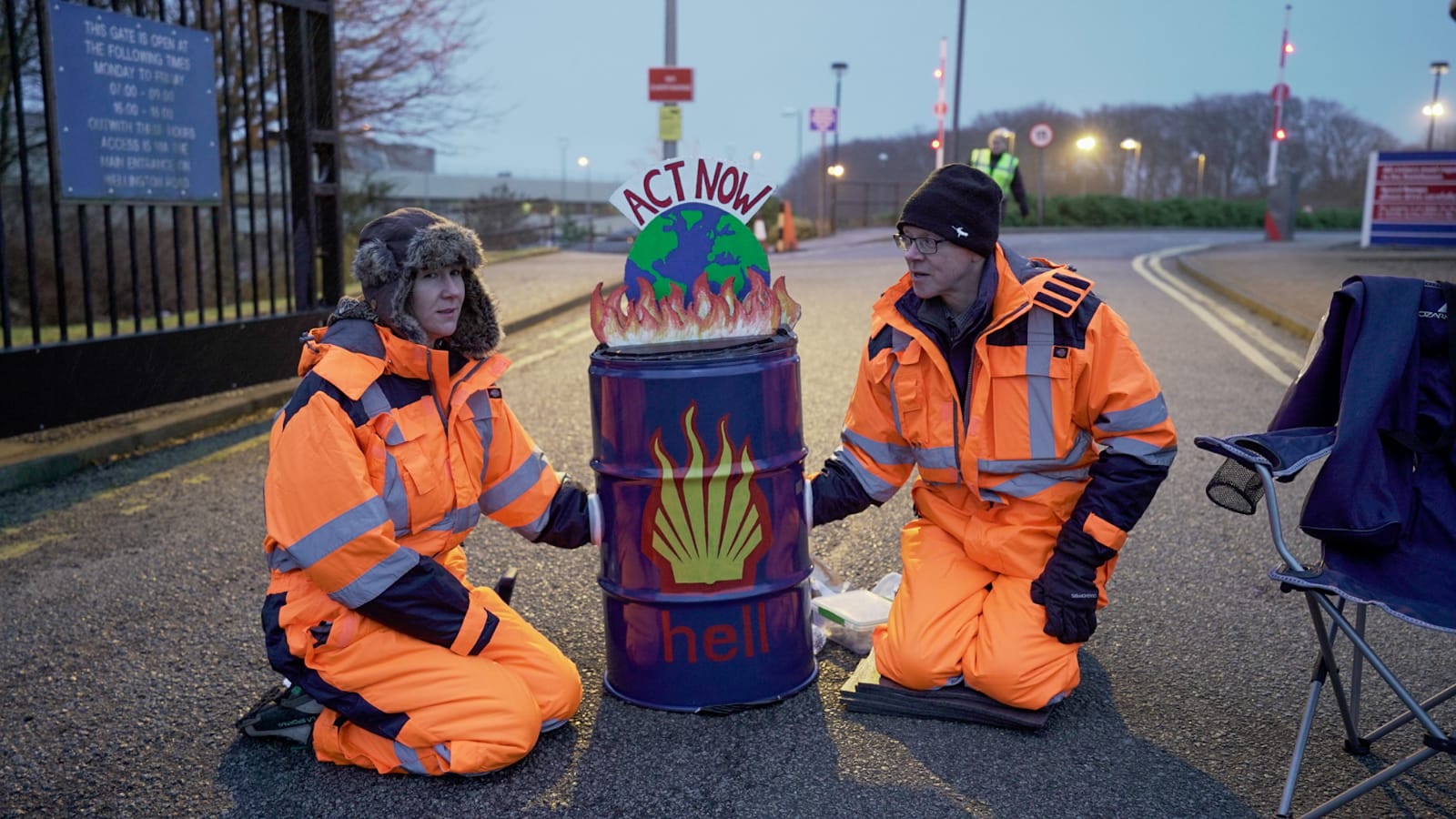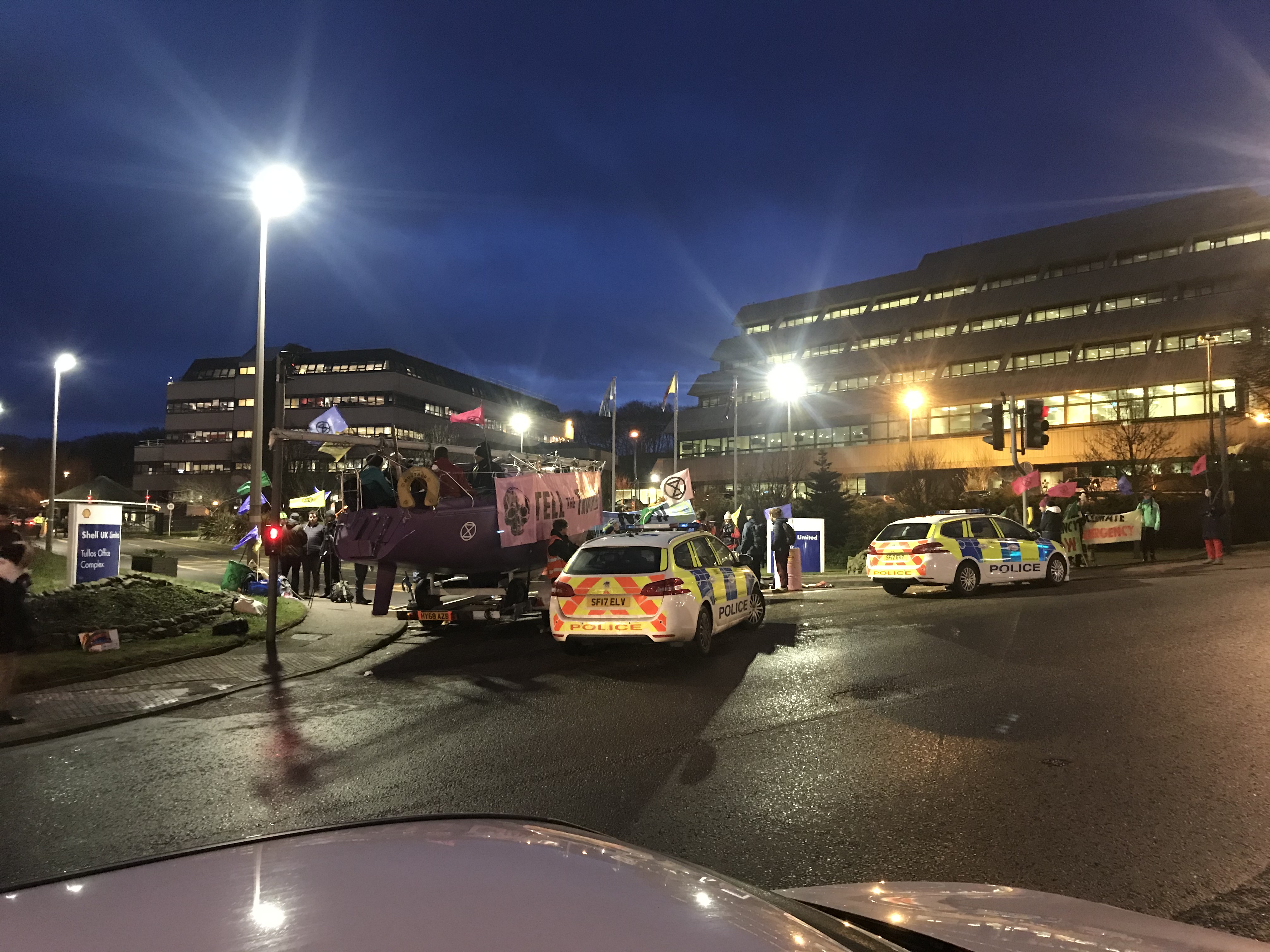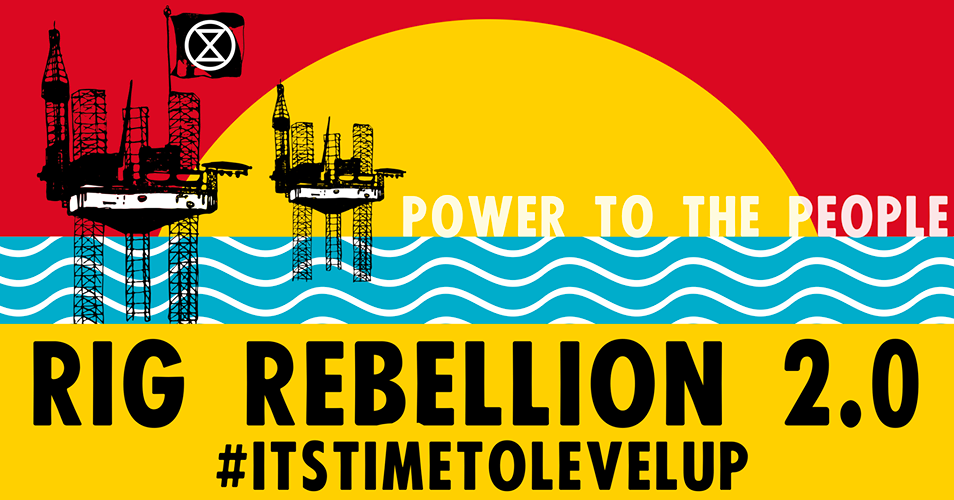They were headline grabbing images and video, undoubtably grabbing attention. But away from the publicity, why did Extinction Rebellion Scotland target oil firm Shell? XRS activist Lauren Waterman explains.
On Thursday, the 16th of January, Extinction Rebellion Scotland activists blocked all of the entrances to Shell HQ with the aim of shutting down the building and disrupting business as usual.
This action was the culmination of Rig Rebellion 2.0 – a ten day long campaign that began when three women occupied a gas rig in Dundee harbour. The rig is leased by Shell and was due to depart to drill two gas wells in the North Sea.
Actions disrupting First Minister’s Questions, Shell petrol stations, and Bailley Gifford – the financial firm that manages MSP’s pension funds and recently upped MSP’s investments in Shell by over 19% – were also included in our campaign.
In response to our actions, Shell released a statement saying, “As we move to a lower-carbon future, we are committed to playing our part, by addressing our own emissions and helping customers to reduce theirs – because we all have a role to play.”
But what role has Shell played in moving to a lower-carbon future?

They have known about the impacts of burning fossil fuels since the 1980’s and yet Shell invest only 5% in sustainable energy and 95% in greenhouse-gas emitting oil and gas.
Shell spends millions of pounds a year on lobbying governments to block climate related policies. Shell continues to explore for new oil and gas fields.
Just this month Shell celebrated a significant gas find off the coast of Australia – a country that has been besieged by months of bushfires that have caused irrevocable damage to its ecosystems, pushing native species to the brink of extinction, and releasing as much carbon into the atmosphere as 100 nations combined.
To add insult to injury, Shell avoided paying corporate income tax in the UK in 2018 despite generating pre tax profits of 731 million dollars.
Rig Rebellion 2.0 sought to expose our government’s, and the financial industry’s complicity with Shell and other oil and gas companies.
These institutions have locked us into a fossil fuel driven economy. At present the Scottish government has set a target for net zero greenhouse gas emissions or 2045. They claim that 2045 is the limit of what is “possible”, but that is because their formula for what is possible prioritises low cost solutions and economic growth.
We can and must transition much more rapidly to a sustainable economic system that is powered by renewables.
We should be throwing everything we’ve got at the climate and ecological emergency.
Instead we have been subjected to decades of misinformation, public money subsidising private profit, and an industry and government that is hell-bent on extracting every last drop of oil and gas from the ground.
Shell produces hundreds of millions barrels of oil & gas at the every day. Both the process of extraction and subsequent burning of those fossil fuels results in the release of millions of tons of greenhouse gases into our atmosphere, putting our planet on track for up to 5 degrees of warming by 2100.
We are already seeing unprecedented climate related catastrophes at 1 degree of warming.
This year alone has brought extreme weather events in Australia, Jakarta, and Mozambique that offer a terrifying preview of what the coming decades could unleash. We are barreling towards a future that is unrecognisable due to the impacts of burning fossil fuels.
The only question is: how bad are we going to allow it to get?
People must become more mindful of our impact in mitigating the climate and ecological crisis, but we know that individual lifestyle choices are not going to be nearly enough.
We also recognise that having a choice over what brands to buy, or what foods to consume is a privilege that many people don’t have.
Similarly there are many communities in Scotland that rely on North Sea oil and gas extraction to feed their families because offshore jobs are the only way that workers can earn a decent living. In an economy that is totally dependent on growth, what will it mean for ordinary people when we finally take the radical steps necessary to stop the acceleration of global warming? What will it mean for them if we don’t?
The CEO of Shell is paid 143 times what Shell’s average worker receives. Industry workers are not the problem here. We can’t blame people with limited choices for being trapped in a system that they had no part in designing.
This is why we advocate for a Just Transition. Governments must be led by unions to protect wages and pensions, and offer paid training for workers who need it as we leave oil and gas extraction behind.

We have to hold those with the most power, the 1%, to account, and put that power back into the hands of the people. We must move to public control of all energy infrastructure.
We must eliminate income inequality, and the handful of billionaires who have built their wealth by holding us hostage to an economy that enshrines the collapse of our planet into its DNA must participate in a robust process of restorative justice.
Many of us who take action with XR Scotland do so at great personal cost. There are activists have disrupted their careers, strained their relationships, jeopardized their finances, been embroiled in long drawn out legal processes, risked their immigration status, and/or cuts to their benefits.
Not to mention the impact that constantly confronting the climate crisis, as well as being involved in high stress confrontations with the police can have on our mental health. Still we recognise that we take action from a position of so much privilege. We know that indigenous peoples have been subjected to centuries of colonial violence, torture, and often murdered for defending the land.
Throughout the entirety of Rig Rebellion 2.0 the Ogoni 9 have never been far from our thoughts. The Ogoni 9 were a group of nine indigenous activists from the Ogoni region of Nigeria who were executed by hanging in 1995 after a nonviolent campaign against the destruction of their lands and waters by Shell and other fossil fuel companies.
Witnesses claimed that some were complicit in coercing false testimony that resulted in the execution of the nine activists. We are called to action by the last words of Ken Saro-Wiwa, an Ogoni leader and writer who was amongst those executed: “Lord take my soul, but the struggle continues.”
Though Rig Rebellion 2.0 has drawn to a close, there will be a Rig Rebellion 3.0, Rig Rebellion 4.0, Rig Rebellion 5.0- as many as it takes until the North Sea is liberated from fossil fuel extraction, and the CEO’s & executives who are responsible for perpetrating so much violence and destruction are held to account. This is only the beginning. Join us.
Lauren Waterman is an activist with Extinction Rebellion Scotland
WANT TO LEARN MORE? READ:
Shell and Exxon’s secret 1980s climate change warnings
Top oil firms spending millions lobbying to block climate change policies, says report
Shell makes new gas discovery in Browse basin
Australia’s fires have pumped out more emissions than 100 nations combined
Shell reveals it paid no UK corporate income tax in 2018
Shell chief’s pay doubles to 143 times average UK employee’s
Climate tracker: Evaluating progress towards the Paris Agreement
Shell awaits court ruling on complicity in deaths of Ogoni Nine
UK and US considered Nigeria naval blockade over Saro-Wiwa execution

